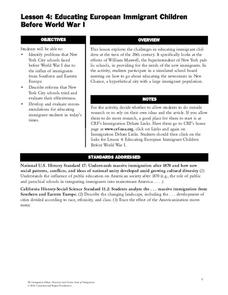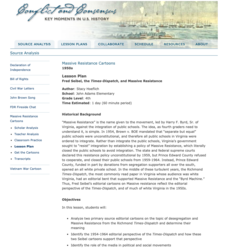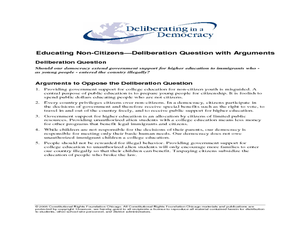Constitutional Rights Foundation
Educating European Immigrant Children Before World War I
As if surviving a journey to America wasn't enough of a feat for early 20th century immigrants, they then needed to settle into American life. Learn about the ways New York public education attempted to meet the needs of its students,...
Anti-Defamation League
Building Alliances
Bystander or up-stander? The final lesson in the "Looking Back Reaching Forward" unit asks participants to consider how they can become involved in encouraging change in their school and community.
Anti-Defamation League
Bringing It Home
The "Bringing It Home" lesson asks scholars to investigate segregation and diversity in their school. They research, collect, and analyze local demographics. After reflecting on their personal experiences with cliques and social...
Anti-Defamation League
With All Deliberate Speed
Has the integration of U.S. schools proceeded "with all deliberate speed?" Has progress been made? Those are the questions young historians must consider as they examine the barriers to and opportunities revealed in a study of timelines...
Anti-Defamation League
The Road to Brown
As part of the study of segregation in U.S. schools, scholars research and create a timeline of events that led to the historic Supreme Court case, Brown V. Board of Education. Groups research a topic or event that led to the decision,...
Anti-Defamation League
The Problem We Still Live With?
Norman Rockwell's painting "The Problem We Still Live With" launches a unit study of racism in the United States and segregation in U.S. schools. In the first instructional activity, scholars discuss the painting, review key elements of...
Center for History Education
Brown v. the Board of Education: Success or Failure?
Desegregation does not mean equality. An eye-opening lesson focuses on the impact of the Brown v. Board of Education decision to end school segregation. Scholars review a series of political cartoons to understand how the public viewed...
Smithsonian Institution
Re-Segregation of American Schools: Re-Segregation
Examine the re-segregation of public schools in a thought-provoking resource. Young scholars read articles and primary sources, complete worksheets, and watch a video to explore the idea that desegregation made schools more segregated....
Smithsonian Institution
Resistance to School Desegregation: The Boston Busing Crisis
Despite how it sounds, Boston's busing crisis wasn't a transportation problem. Academics address the problems faced by African Americans following school desegregation and the struggle to receive equal educational opportunities. Scholars...
Smithsonian Institution
Separate is Not Equal: Fight for Desegregation
Separate is not equal! An eye-opening lesson plan delves into the past to understand the fight for desegregation and how it impacted African American communities. Academics complete two one-hour lessons using documents, photographs, and...
Radford University
Government Spending
Spend some time with lines of best fit. An informative unit has learners investigate government spending. They research data on poverty, educational spending, social security, and defense spending, and then analyze lines of best fit for...
Roy Rosenzweig Center for History and New Media
Fred Seibel, the Times-Dispatch, and Massive Resistance
A lesson challenges scholars to analyze editorial cartoons created by Fred Seibel, illustrator for the Times-Dispatch, during the Massive Resistance. A class discussion looking at today's editorial pages and Jim Crow Laws leads the way...
New York State Education Department
Global History and Geography Examination: August 2014
What does the class know about world history and geography? The assessment tests high school scholars' skills in a state standardized test from the New York Department of Education. It covers topics such as the Enlightenment and the...
ProCon
School Vouchers
Do school vouchers for private schools improve public school education, or do they lead to worse academic performance? Scholars read the top four pros and cons to decide if school vouchers are a good idea. They also participate in an...
PBS
“He Named Me Malala”: Understanding Student Activism Through Film
Malala Yousafzai has become the face of social activism. After watching He Named Me Malala and short student-made films about what young people can do to become instruments of change, class members reflect on what it means to be an...
Curated OER
Corporal Punishment
Nineteen states legally permit school officials to physically punish children. Scholars learn more about the topic as they use the website to prepare for a class debate or discussion. Pupils read background information and discover the...
Elizabeth Murray Project
The Education of Women in Colonial America
What educational opportunities were available to women during the colonial era in American history? How did the opportunities available to women differ from those for men? To answer this question, class members examine a series of...
Center for History and New Media
The Daily Experience of the Laurel Grove School, 1925
What was daily life like for those attending segregated schools in 1925? Modern learners fill out a KWHL chart as they explore historical background and primary source documents about the Laurel Grove School in Fairfax County, Virginia....
Center for History and New Media
Founding of the Laurel Grove School and Other "Colored" Schools in Fairfax County, 1860–1890
The right to public education was not always so clear in American history. Readers study several primary and secondary source documents, including property deeds, maps, and photographs, about the founding of local schools during the...
Deliberating in a Democracy
Educating Non-Citizens
Students distinguish between the privileges of being a U.S. Citizen and privileges that are forfeited if not a U.S. Citizen. For this history lesson, students analyze the rights of people in a democratic society through research,...
K12 Reader
Public Education
Your pupils may not know that school was not always required. Teach them a bit about the history of public education with a reading passage and related questions.






















